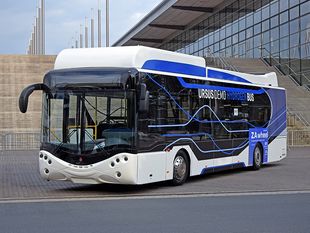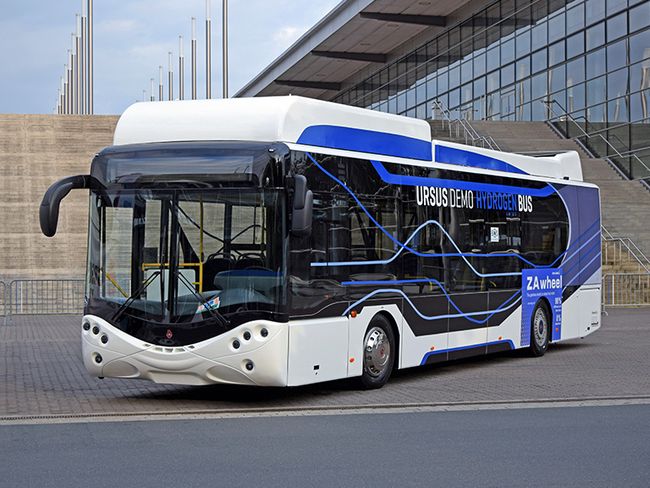Hydrogen’s great advantage lies in the fact that, in principle, it can replace petrol, diesel and kerosene. It can be generated wherever there is water and electricity, and is as quick and easy to fill up as conventional fuels. Currently only its availability is limited, though this is soon set to change with the support of targeted funding programmes initiated by the German federal government.
Germany is providing around one billion Euros’ worth of funding per year to build a comprehensive hydrogen mobility infrastructure for mobility purposes.
This act is driven by the Paris Climate Agreement, with its ambitious targets of a largely greenhouse-gas-neutral Europe by 2050. Around 40 per cent of the power needed for Germany’s transport sector is set to be hydrogen-generated by then. Truck traffic will make up the largest proportion of the transport industry’s switch to hydrogen technology, at some 70 percent. This will reduce transport’s previous dependence on fossil energy imports from 95 per cent to 75 per cent.




Hydrogen mobility: Safe approaches to achieving climate targets
The main challenge for industry, transport companies and policymakers lies in making a comprehensive infrastructure available for fossil-free hydrogen mobility efficiently, safely and profitably – as quickly as possible.
HydroHub provides an extensive range of services for this. In addition to technical aspects, it also includes devising mobility concepts and advising on hydrogen investment decisions for H₂ vehicle fleets. We also offer training options (AHW, transport companies), and assist with gradually further developing and imparting hydrogen expertise within organisations.
To ensure technology in the hydrogen mobility sector becomes a safe solution, we use market-oriented research, feasibility studies and concepts for operational and plant safety in all our work. To do this, HydroHub, as the first ever mobility service provider, shares the expertise gained by various companies of the TÜV NORD GROUP over eight decades.
Engineering for hydrogen mobility: We take H₂ from the research phase to market-readiness
HydroHub provides an overview of measures for continuous improvement and further fuel-cell cost reduction. Security and engineering concepts, together with emission and coverage measurements for the various types of vehicles, enable experts from companies of the TÜV NORD GROUP to assist with any development stages in the lead-up to market-readiness.
Fuel cells in vehicles are currently around 60 per cent efficient. A modern Otto/petrol engine is around 24 per cent efficient, while diesel engines can at least utilise around 40 per cent of the energy stored in the fuel. Incidentally, jet engines have around the same efficiency degree as modern Otto engines – the best achieve nearly the same output as diesel engines.
In view of this, everything appears to argue in favour of using fuel cells in vehicles, which have to cover long distances and transport large loads on a daily basis. Germany’s National Hydrogen Council (NWR) is also recommending that trucks be fitted with hydrogen hybrid power units as the next step for hydrogen-based mobility.
As part of the National Innovation Programme for Hydrogen and Fuel Cell Technology (NIP), the German federal government is providing funding to support the launch of hydrogen and fuel cell technology. HydroHub can advise on the applicable funding frameworks and on how to implement the measures.
Building infrastructure safely to get hydrogen mobility up and running
Depot and petrol station infrastructure needs to be adapted to the new technology. This involves testing how the new gas storages can be set out and filled safely, and how vehicles can be fuelled up at no risk to anyone involved. Transporting hydrogen to petrol stations, and connecting it to gas pipes, also needs to be planned from a safety perspective – not least to increase acceptance of the new fuel. Yet another area where HydroHub can share the extensive knowledge of various companies of the TÜV NORD GROUP.
If you’re looking to move towards hydrogen mobility, contact us and briefly describe your project. We’ll assemble a team of experts for you.
Insight into engineering for hydrogen mobility
HydroHub's support includes engineering services in hydrogen mobility for a wide range of segments. These include feasibility studies, expert reports, investment consulting, funding management, authority engineering and much more.
With our broad competence and our experts, we are able to advise you with comprehensive engineering for hydrogen mobility, for example, in the dimensioning of components and in the selection of the right location for storage and power-to-gas plants. In the precise budget and cost analyses, we work to ensure that you benefit from the lowest possible costs and high grid compatibility in your individual hydrogen mobility concept.
Let's look at hydrogen filling stations as a component of the infrastructure for hydrogen mobility: Here, for example, HydroHub supports you with engineering services for technical design. In addition to appropriate dimensioning of the filling station, this also requires the identification of the correct location.
In some cases, companies or municipalities need a dense network of hydrogen filling stations. HydroHub helps with hydrogen mobility consulting to design, plan and implement networks accordingly. We can also cover permanent monitoring: The function and cost efficiency of your project/facility is continuously analysed and collected data is made available to optimise processes.
As the example of hydrogen filling stations clearly shows, the realisation of hydrogen mobility in fleets, companies and other areas requires a holistic concept. Investment and economic planning, security of supply, plant planning including storage solutions, safety, applications and other components must be integrated into this concept.
With our engineering services for hydrogen mobility, you therefore benefit from a comprehensive service where you get everything from a single source. This is how hydrogen mobility is successfully implemented in your company.
